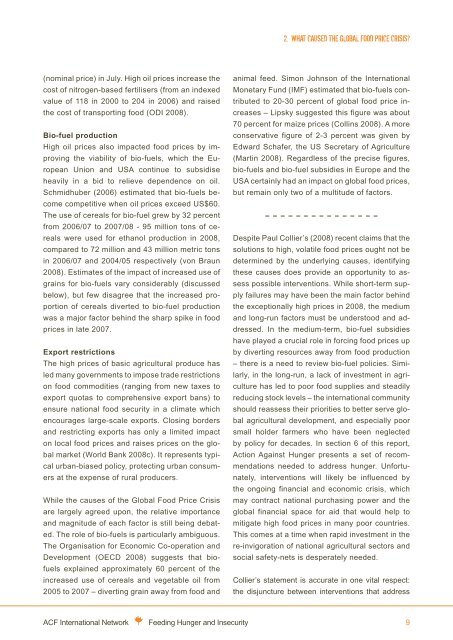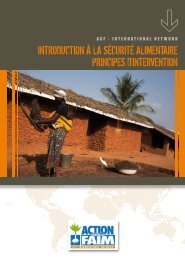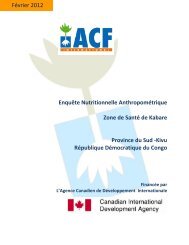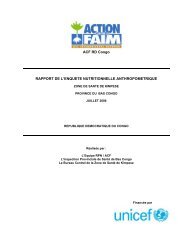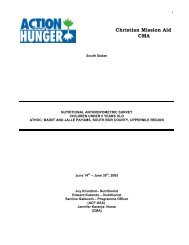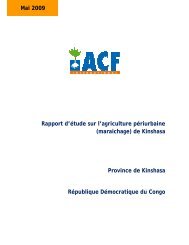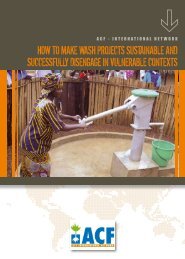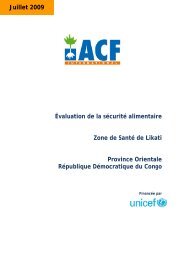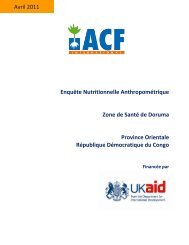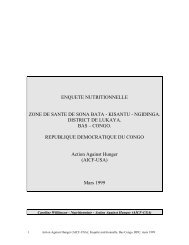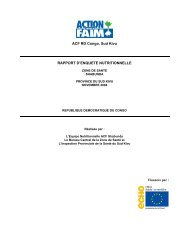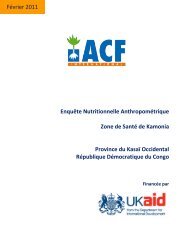Feeding hunger and insecurity
Feeding hunger and insecurity
Feeding hunger and insecurity
- No tags were found...
You also want an ePaper? Increase the reach of your titles
YUMPU automatically turns print PDFs into web optimized ePapers that Google loves.
2. what caused the global food price crisis?(nominal price) in July. High oil prices increase thecost of nitrogen-based fertilisers (from an indexedvalue of 118 in 2000 to 204 in 2006) <strong>and</strong> raisedthe cost of transporting food (ODI 2008).Bio-fuel productionHigh oil prices also impacted food prices by improvingthe viability of bio-fuels, which the EuropeanUnion <strong>and</strong> USA continue to subsidiseheavily in a bid to relieve dependence on oil.Schmidhuber (2006) estimated that bio-fuels becomecompetitive when oil prices exceed US$60.The use of cereals for bio-fuel grew by 32 percentfrom 2006/07 to 2007/08 - 95 million tons of cerealswere used for ethanol production in 2008,compared to 72 million <strong>and</strong> 43 million metric tonsin 2006/07 <strong>and</strong> 2004/05 respectively (von Braun2008). Estimates of the impact of increased use ofgrains for bio-fuels vary considerably (discussedbelow), but few disagree that the increased proportionof cereals diverted to bio-fuel productionwas a major factor behind the sharp spike in foodprices in late 2007.Export restrictionsThe high prices of basic agricultural produce hasled many governments to impose trade restrictionson food commodities (ranging from new taxes toexport quotas to comprehensive export bans) toensure national food security in a climate whichencourages large-scale exports. Closing borders<strong>and</strong> restricting exports has only a limited impacton local food prices <strong>and</strong> raises prices on the globalmarket (World Bank 2008c). It represents typicalurban-biased policy, protecting urban consumersat the expense of rural producers.While the causes of the Global Food Price Crisisare largely agreed upon, the relative importance<strong>and</strong> magnitude of each factor is still being debated.The role of bio-fuels is particularly ambiguous.The Organisation for Economic Co-operation <strong>and</strong>Development (OECD 2008) suggests that biofuelsexplained approximately 60 percent of theincreased use of cereals <strong>and</strong> vegetable oil from2005 to 2007 – diverting grain away from food <strong>and</strong>animal feed. Simon Johnson of the InternationalMonetary Fund (IMF) estimated that bio-fuels contributedto 20-30 percent of global food price increases– Lipsky suggested this figure was about70 percent for maize prices (Collins 2008). A moreconservative figure of 2-3 percent was given byEdward Schafer, the US Secretary of Agriculture(Martin 2008). Regardless of the precise figures,bio-fuels <strong>and</strong> bio-fuel subsidies in Europe <strong>and</strong> theUSA certainly had an impact on global food prices,but remain only two of a multitude of factors.Despite Paul Collier’s (2008) recent claims that thesolutions to high, volatile food prices ought not bedetermined by the underlying causes, identifyingthese causes does provide an opportunity to assesspossible interventions. While short-term supplyfailures may have been the main factor behindthe exceptionally high prices in 2008, the medium<strong>and</strong> long-run factors must be understood <strong>and</strong> addressed.In the medium-term, bio-fuel subsidieshave played a crucial role in forcing food prices upby diverting resources away from food production– there is a need to review bio-fuel policies. Similarly,in the long-run, a lack of investment in agriculturehas led to poor food supplies <strong>and</strong> steadilyreducing stock levels – the international communityshould reassess their priorities to better serve globalagricultural development, <strong>and</strong> especially poorsmall holder farmers who have been neglectedby policy for decades. In section 6 of this report,Action Against Hunger presents a set of recommendationsneeded to address <strong>hunger</strong>. Unfortunately,interventions will likely be influenced bythe ongoing financial <strong>and</strong> economic crisis, whichmay contract national purchasing power <strong>and</strong> theglobal financial space for aid that would help tomitigate high food prices in many poor countries.This comes at a time when rapid investment in there-invigoration of national agricultural sectors <strong>and</strong>social safety-nets is desperately needed.Collier’s statement is accurate in one vital respect:the disjuncture between interventions that addressACF International Network <strong>Feeding</strong> Hunger <strong>and</strong> Insecurity 9


